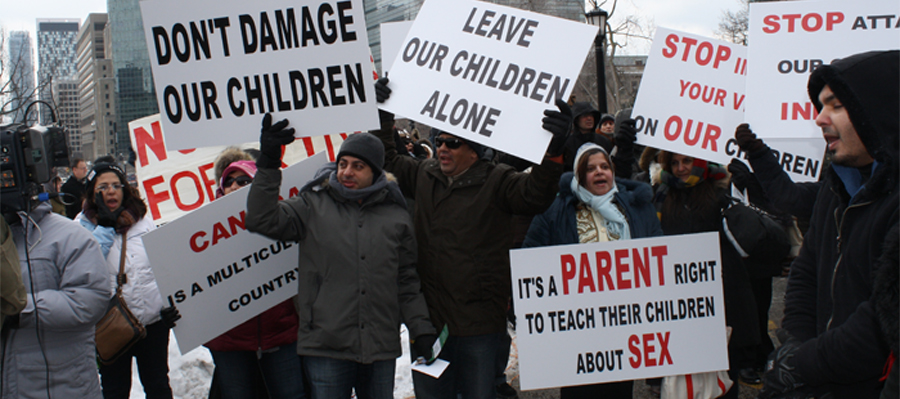
In September 2015, the Ontario government rolled out a radically new revised sex education curriculum. When released, a phenomenal grassroots campaign ensued to have it retracted. Huge rallies, 14,000 likes in protest on a Facebook page, a petition with 18,000 signatures, and 20,000 students were kept home at one point in a protest against this curriculum. This movement was so large that even Dr. Miriam Grossman, a world-renowned child, adolescent and adult psychiatrist agreed to speak to a parent’s group about the revised curriculum because she “has never seen anything like this before”. People weren’t upset about having a new sex education curriculum, and even having it reviewed; what they were, and still are upset about is how it was rolled out, and the contents of the human development and sexual health unit based on a one-sided view of values. This topic is still a very contentious one in discussions even today, as it is seen as crossing the line between what should be taught at home and what should be taught at school. In addition, it was mandated into the classrooms with very little consultation with parents. The massive outcry highlights a disturbing situation, however, it is good to see parents rising up because this is not just about the topic of sex education, as much as it is about the role of education and the role of parents.
The change in the sex education curriculum isn’t the core of the problem. It is only the open sore that hurts too much and can’t be easily hidden. This new curriculum starkly illuminates a much deeper issue in our educational system. It is the issue of values, and who has the responsibility to teach those values.
For decades and decades now, education has gradually taken over many of the roles of parenting. Educators have taken it upon themselves to teach etiquette, social norms, respect for one-another, relationships, discipline, and other skills and values that used to be the responsibility of parents. In the past, parents took the responsibility to teach this at home. Educators have, in many ways, taken over the role of the parent, and most would argue that they have had to, because it isn’t happening at home. Should educators be responsible for all of this? Can they really teach it all?
What is the result? The expected role of the parent has changed. Their expectations for themselves have also changed. Some think that it is okay to not teach etiquette at home. They are confused as to who is responsible to teach their child how to arrive on time, or get his or her work done. It never ceases to surprise me when I hear a parent expecting a teacher to be the sole advocate for discipline and rigour, leaving the parents to be the “adult friend”.
As parents, we have let this shift of teaching values and social norms seep into the educational arena to an extent that many now expect it to be completely taken care of in the classroom. The new sex education curriculum has highlighted this shift of responsibilities as it is one of our most sensitive subjects, and schools are teaching it to our most vulnerable sector. Sex education is a tough discussion for parents to have with their children, but an essential one, as it should be discussed with trusted adults, rather than completely leaving it to teachers who have their child for short 1-year stints. This is why the development and release of such a delicate subject must be done with utmost sensitivity, planning and preparing with parents as much as with educators.
My view on this new sex education curriculum? In brief, I have a background in science and therefore look for curriculum content that is fact-based. The information should be accurate, and when introducing very sensitive information, it should include the scientific facts. This subject matter is extremely sensitive, and there are serious physical and mental ramifications should someone end up making a wrong decision. This should be introduced with a focus on science, rather than on “feelings”. The curriculum could have stated many more scientific facts outlining what happens to bodies when involved in various types of sexual relationships. Also, from my experience, I know that young 11 and 12 year olds have the mental maturity to make the decisions that they are told to make in this curriculum based on “feelings”. Because of the values and morals intertwined in this subject, parents should have been included as a very strong and valuable part of the consultation process when developing the program. Just sending out a survey to parent council chairs is simply not good enough.
The government has a responsibility to ensure that society is safe and ready for the future. People elected by our citizenry are to help to strengthen the society’s values. Educators and parents have the responsibility to ensure that children and youth have the knowledge and skills to prepare themselves for their futures. It is a fine line that is crossed whenever anyone thinks that they can unilaterally mandate a change to the values of individuals, the family unit, or of a country. It is an equal problem when people don’t take any responsibility for teaching their children.
Kim Langen
CEO & Co-Founder
Spirit of Math Schools



